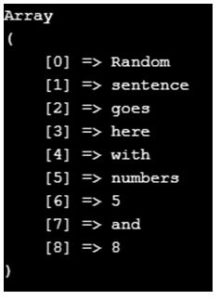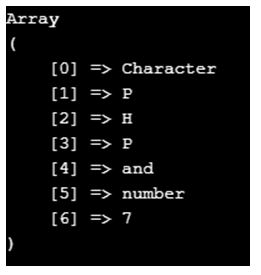Updated April 13, 2023

Introduction to PHP sscanf()
The sscanf() is a pre-defined function in PHP which returns parsed input string after parsing it as per the required format. It takes the input of 2 parameters and gives us the required array and in other case when other parameters are passed such as optional ones, the data parsed will be stored in them. It throws an error when there are more specifiers than the variables to contain these and the extra variables will get NULL if there are lower specifiers present than the variables.
Syntax of PHP sscanf()
Given below is the syntax of PHP sscanf():
sscanf(input_string, format, arg1, arg2, arg3....)Input Parameters:
1. input_string: This is the input string to be read.
2. format: We can specify the formats as per the below list as required:
- %%: This format will be in percent sign.
- %c: This format returns the character as per the ASCII values required.
- %d: This format is for signed decimal value. (Can be zero, negative or positive)
- %e: This format returns scientific notation in lower case. (e.g. 1.2e+2)
- %u: Used for representing unsigned decimal number which is either equal to or greater than zero.
- %f: This is used to represent a floating point number.
- %o: This is used to represent an octal number.
- %s: This represents string format.
- %x: This represent lower case letters for a hexadecimal number.
- %X: This represent uppercase letters for a hexadecimal number.
There are also a few additional format values which are placed between the % symbol and the letter we give. (For example %0.3f)
- + (This forces both + and – values in the beginning of numbers and there are only negative values marked by default).
- ‘ (This describes as to what to be used as a padding and space is the default value here. This should be used along with the width specifier. For example: %x30s which uses x for padding).
- – (This on the left will give us the variable value).
- [0-9] (This gives the minimum width which is held by the variable value).
- . [0-9] (This describes the total number of decimal numbers or the maximum length of the string).
- arg1: This is an optional parameter and also the first variable we store data into.
- arg2: This is also optional and the second variable we store data.
- arg++: This is optional and represents the successive variables we continue storing our data in.
Return values: Here there are 2 cases which can happen:
- If there are only 2 values which are given as input parameters to this function then the data will be returned in the form of an array.
- If other optional parameters are passed then the parsed data are stored in them.
- If there are multiple specifiers exceeding the variables that can contain them then an error is thrown.
- If there are less specifiers than the variables which they can contain, then NULL will be assigned to those variables.
- -1 will be returned if more specifiers are present than in the expected format.
Examples of PHP sscanf()
Given below are the examples mentioned:
Example #1
Code:
<?php
$text = "Random sentence goes here with numbers 5 and 8";
$f = sscanf($text,"%s %s %s %s %s %s %d %s %d");
print_r($f);
?>Output:

In this example we are specifying a text as required. Then using the sscanf function and specifying the correct formats which represents our input string. Hence in the output the exact string is displayed as an array. This only if the format matches the data.
Example #2
Code:
<?php
// fetching the unique ID of product
list($ID) = sscanf("SN/680001", "SN/%d");
// fetching date of manufacturing
$manf = "March 03 2001";
// fetching the date of expiry
$expiry = "March 03 2002";
// Parsing using sscanf function
list($mon, $day, $yr) = sscanf($manf, "%s %d %d");
list($mon, $day, $yr) = sscanf($expiry, "%s %d %d");
echo "Product $ID was manufactured on $manf and will expire on: $yr-" . substr($mon, 0, 3) . "-$day\n";
?>Output:
![]()
In this example we are displaying how to check and display the product information like its Unique manufacturing ID and the date of expiry. So in the first parameter we are fetching the ID information and parsing it in %d format. Next we are fetching the manufacturing date and expiry date of the product and parsing the same as required format using sscanf function. Then displaying all the parsed things in one sentence. Multiple things can be added here to display the information we want.
Example #3
Code:
<?php
// Fetching designer info and to generate DressInfo entry
$design = "13\tCoco Chanel";
$str = sscanf($design, "%d\t%s %s", $ID, $firstname, $lastname);
// Displaying all the above details after formatting
echo "<author id='$ID'>
<firstname>$firstname</firstname>
<surname>$lastname</surname>
</author>\n";
?>Output:

In this example we are using sscanf function to first parse the ID and name of the designer. Then displaying the same in HTML format by splitting the names into first name and last name.
Example #4
Code:
<?php
// We are initializing the string here
$arr = "Character PHP and number 7";
// Parsing the input string according to different format
$format = sscanf($arr,"%s %c%c%c %s %s %d");
print_r($format);
?>Output:

In the above example we are first initializing the string as required and this time including a few character sets in combination with strings. The same we are parsing using the sscanf function.
Conclusion
As seen above in all the examples, sscanf function in PHP is basically used to parse any type of the input string as per the requirements. There are a few cases where this function shows inefficiency to parse the strings, where there may be incorrect output when we try to parse a tab delimited string also having normal spaces in between. It also does not give the expected output if in the code there is a file name with its extension where it finds difficult to separate the two in presence of a “.”.
Recommended Articles
This is a guide to PHP sscanf(). Here we discuss the introduction to PHP sscanf() along with appropriate syntax and respective programming examples for better understanding. You may also have a look at the following articles to learn more –


